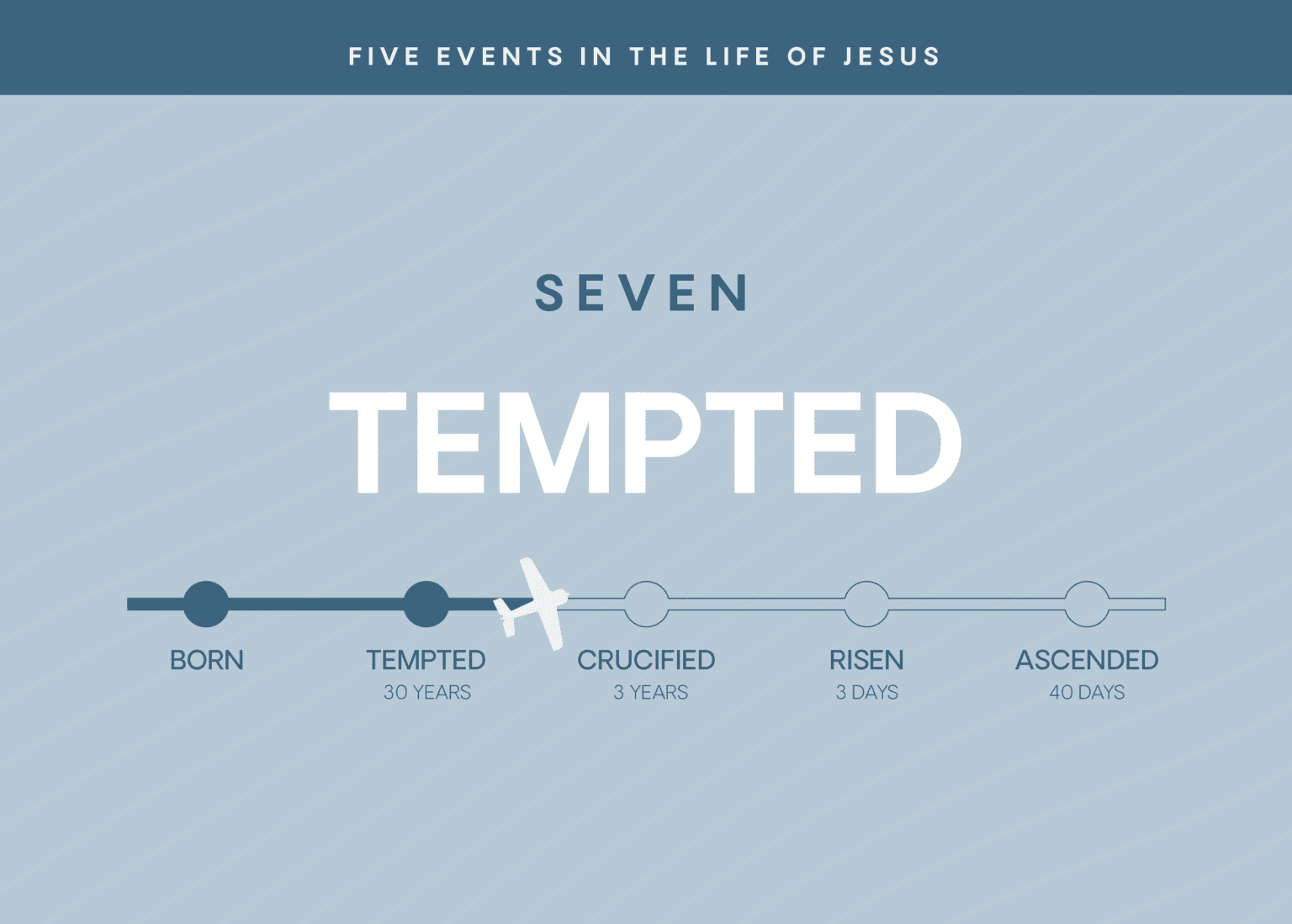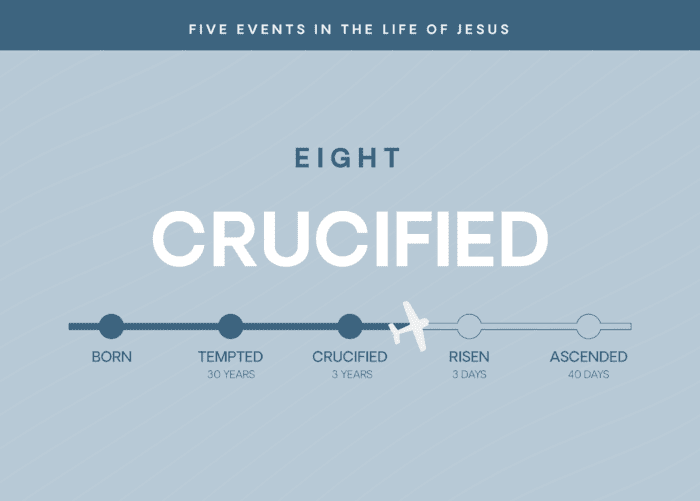
FLY Through the Bible
7. Tempted

Jesus was 30 years of age when He began His public ministry. He was baptized in the river Jordan, identifying Himself fully with men and women who seek to live for the glory of God. The Holy Spirit descended on Jesus, and an audible voice from heaven said, “This is my beloved Son, with whom I am well pleased” (Matthew 3:17).
Filled with the Holy Spirit, Jesus went into the desert, where He endured a period of intense temptation that lasted for forty days. It is significant that the Spirit led Jesus into the desert (Luke 4:1). He was stalking the enemy. He had come into the world to destroy Satan’s work, and the first step in His public ministry was to confront our enemy and triumph where Adam had failed.
Confusion, presumption, and ambition
Satan appears to have a limited number of strategies. This is evident from the parallels between his successful tempting of Adam and Eve in the garden and his total failure to compromise the integrity of the Lord Jesus Christ in the desert.
Satan’s first strategy in the garden was an attempt to create confusion about what God had said. He asked Eve, “Did God actually say, ‘You shall not eat of any tree in the garden’?” (Genesis 3:1). In the desert, the enemy tried to create confusion about Jesus’ identity. “If you are the Son of God,” he said, “command these stones to become loaves of bread” (Matthew 4:3). But Jesus did not need to perform a miracle to prove that He was, and is, the Son of God. He answered, “It is written, ‘Man shall not live by bread alone, but by every word that comes from the mouth of God’” (Matthew 4:4).
His second strategy in the garden was an attempt to promote presumption. Satan tried to convince Eve that she could disobey the command of God without consequence. “You will not surely die,” he said (Genesis 3:4). He used the same line of argument when he dared Jesus to throw Himself down from the highest point of the temple, with the promise that God would send an angel to catch Him. Such a spectacular display would surely get people’s attention. But Jesus knew the difference between faith and pre- sumption: “Again it is written, ‘You shall not put the Lord your God to the test’” (Matthew 4:7).
The third strategy centered on ambition. Satan promised Eve that asserting her independence would put her in a position of equality with God. “You will be like God,” he said (Genesis 3:5). Having succeeded with this strategy once, the enemy tried the same approach against Jesus, saying in essence, “Worship me and I will give you all the glory of the kingdoms of the world” (Luke 4:5–7). But Jesus said, “Be gone, Satan! For it is written, ‘You shall worship the Lord your God and him only shall you serve’” (Matthew 4:10).
Satan launched everything he had in his assault against Jesus, but he could not break Him. And after he had exhausted every strategy he knew, he was left with no alternative but to retreat.
The full force of the enemy
Only Jesus knows the full power of temptation because only Jesus has withstood the full force of the enemy’s assault.
Imagine three airmen flying jets over enemy territory during a war. They are shot down, captured, and then taken by the enemy for interrogation. One by one they are brought into a darkened room.
The first airman gives his name, rank, and serial number. His captors ask him for the position of his forces. He knows that he must not give this information, but he also knows that the enemy is cruel. So he tells them what he knows.
The second airman is brought in, and they begin to question him. He is determined not to give in. So the cruelty begins and eventually it overwhelms him. He breaks and tells them what he knows.
Then the third airman comes in. “You will not break me,” he says. “Oh yes, we will. We have broken every man who has ever come into this room. It is only a matter of time; you’ll see.”
The cruelty begins, but he does not break. So it is intensified, and then it is intensified more, until it feels unbearable, but still he does not break.
Finally, there comes a point when they have tried everything they know. “It’s no use,” they say. “He is not like any other person we’ve had in this room. We can’t break him.”
Which of these airmen faced the full force of the enemy? The only one to know the full force of the enemy’s assault is the one who did not break. So don’t ever think that Jesus’ temptations were less than yours. Jesus knows the full power of temptation because Jesus has withstood the full force of the enemy’s assault.
Jesus is able to help you when you are tempted. He under- stands your temptations, because He Himself has been tempted, and He can give you the strength you need to prevail in your battle (Hebrews 4:15–16).
The promised deliverer
Jesus returned from the desert in the power of the Holy Spirit to begin His public ministry. In the synagogue at Nazareth, He read the words of Isaiah the prophet about the promised deliverer:
“The Spirit of the Lord is upon me,
because he has anointed me
to proclaim good news to the poor.
He has sent me to proclaim liberty to the captives
and recovering of sight to the blind,
to set at liberty those who are oppressed,
to proclaim the year of the Lord’s favor.” (Luke 4:18–19)
Jesus rolled up the scroll, gave it to the attendant, and sat down. The eyes of everyone were on Him, waiting for what He would say: “Today,” Jesus announced, “this Scripture has been fulfilled in your hearing” (Luke 4:21). You might think that the people would welcome God’s promised deliverer, but the response of these people was to drive Him out of their town (Luke 4:29).
What followed was three years in which Jesus gave Himself to serving God by serving others. His disciples witnessed His power over nature, as He calmed a storm; over demons, as He released the oppressed; over disease, as He healed the sick; and even over the grave, as He raised the dead. Many believed and followed Him, but there was also relentless opposition, which ultimately led to His arrest, trial, and crucifixion.
Questions for Reflection and Discussion
Details
Next

8. Crucified

Take the First Step to Open Your Bible
Join 35,000+ people who get ‘Open Weekly’. Every Wednesday, you’ll get hand-picked resources designed to inspire, encourage, and challenge you in opening your Bible.
Join Pastor Colin In-Person!
Do you want to understand the Bible story? 📖
Pastor Colin Smith’s upcoming event FLY THROUGH THE BIBLE, is a high-altitude exploration of the entire Bible story. This brief introduction to the Bible will help you grasp who God is, who you are, who Jesus is, and what He offers to you!
Coming to 4 cities this fall:
- St. Louis, Missouri
- Twin Cities, Minnesota
- Des Moines, Iowa
- Indianapolis, Indiana
Will you join us?

It looks like you're viewing the site from outside the US. Click below to visit our UK site or close this pop-up to view the international site.